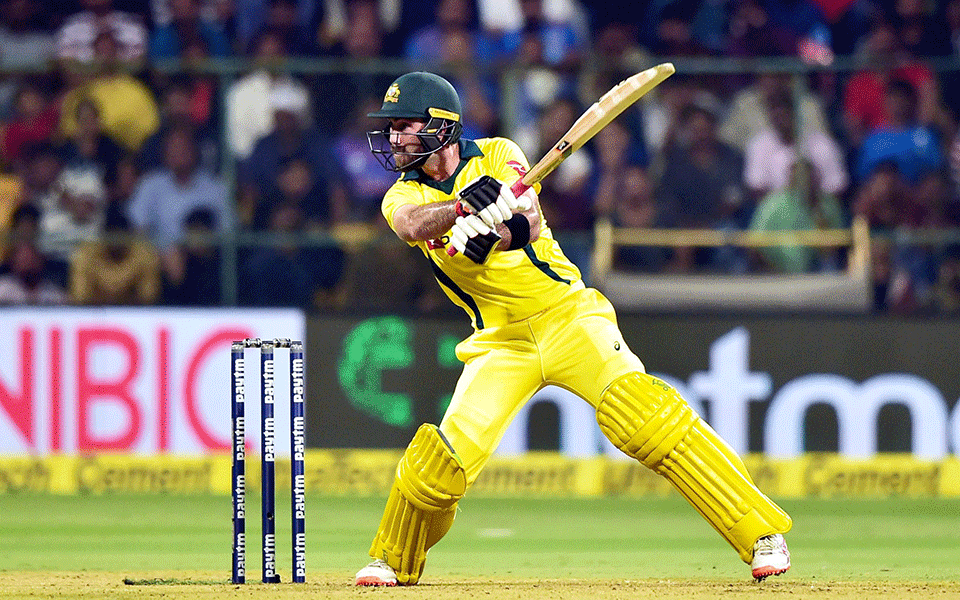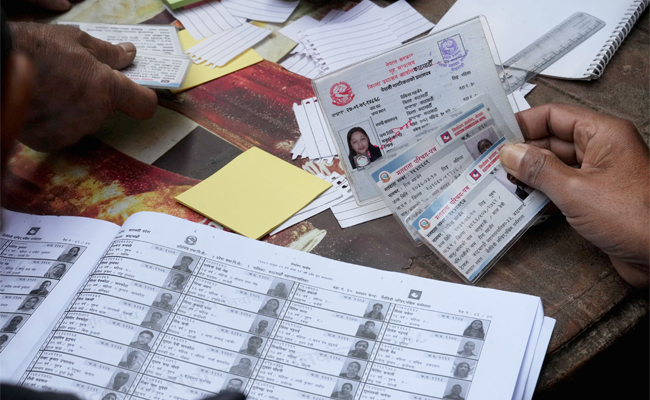Bengaluru, Feb 27: Glenn Maxwell fired Australia to their maiden T20 series win over India with a sensational hundred, overshadowing India skipper Virat Kohli's special effort in the second and final match here on Wednesday.
Maxwell (113 not out off 55 balls) went on a rampage, smashing as many as nine sixes on way to his third century in the shortest format. He took the game away from India, who should have defended 190 for four after Kohli and Mahendra Singh Dhoni shared a 100-run stand for the fourth wicket to take the hosts to a competitive total.
In the end, Australia cantered to a famous seven-wicket win with Maxwell fittingly finishing the game with a six and four.
Prior to the game, Australia had never beaten India in a T20 series, home or away. They had beaten India way back in 2008 at Melbourne but that was a one-off game.
The visitors kept themselves in the chase despite a wobbly start which saw them being reduced to 22 for two in four overs.
Opener D'Arcy Short and Maxwell shared a 73-run standoff 43 balls to keep the game on even knell before the former fell in the 12th over.
India had to defend with only five bowling options which required all-rounder Vijay Shankar to complete his quote of four overs.
Shankar (2/38), who did not bowl in his last three T20s, put up a decent effort, picking up wickets of Short and Finch. Short could not last long after being dropped on 36 by Rishabh Pant.
Australia remained very much in the game with Maxwell plundering the Indian attack in the middle.
It was anyone's game as Australia needed 60 off the last 30 balls with seven wickets in hand.
Maxwell smashed Yuzvendra Chahal for two handsome sixes, including a spectacular reverse hit, to tilt the game in Australia's favour.
Earlier, skipper Kohli and Dhoni delighted the Chinnaswamy crowd with a 100-run stand.
Kohli led from the front in a must-win tie, hammering an unbeaten 72 off 38 balls in a knock including half a dozen sixes while Dhoni played the supporting role well with 40 off 23 balls.
It was a typical Dhoni innings that comprised three fours and as many sixes and came after a rather slow 29 off 37 balls in Vizag on Sunday night.
Opener K L Rahul was amongst runs again, scoring 47 off 26 in front of his home crowd.
Considering the pitch wore a greenish look, India brought in pace all-rounder Vijay Shankar in place of spinner Mayank Markande while fast bowler Umesh Yadav made way for Siddharth Kaul.
India made a third change by resting Rohit Sharma and bringing back Shikhar Dhawan to open alongside Rahul. The southpaw was rested from the series opener.
With a series win at stake, Australia opted to field for the second game in row.
The home team got a move on in the third over of the innings bowled by left-arm pacer Jason Behrendorff.
Local hero Rahul slashed a short and wide ball between cover and point before Dhawan flicked one off pads for another four with the over going for 12 runs.
The fifth over was even more productive for India as pacer Jhye Richardson conceded 15 runs after Rahul dispatched him for consecutive sixes, a top edge that flew over over deep fine leg and a crisp drive that went all the way over cover.
The stylish Karnataka batsman, who recently went through a rough patch both on and off the field, was back in his elements.
Rahul meted out similar punishment to Pat Cummins in the following over, hitting him for back-to-back sixes.
His sublime strokeplay seemed effortless but it was no mean feat to pull a bowler of Cummins' pace over backward square leg a ball after he whipped the Australian for a six over deep midwicket. India reached 53 for no loss in six overs.
With Dhawan a mere spectator at the other end, a third hundred in T20 Internationals for Rahul was very much on the cards before he fell to a soft dismissal, trying to guide a slower one off Nathan Coulter-Nile over third man only to be caught by Richardson.
A struggling Dhawan too departed soon after, albeit to a questionable running catch in the deep from Marcus Stoinis after the on-field umpire referred the decision to the third umpire following his soft signal.
Rishabh Pant's early dismissal made it 74 for three in the 11th over as he mistimed one off chinaman D'Arcy Short and Richardson pulled off a sensational diving catch at long off.
Two quick dismissals brought two heavyweights -- Kohli and Dhoni -- in the middle. They enjoy batting together and that came to the fore as they completed a 50-run partnership off 29 balls.
Dhoni, who was criticised for his knock on Sunday, showed more intent from the word go as he began with a six over mid wicket off Short.
Kohli kept himself busy by rotating the strike early in his innings. He went ballistic in the 16th over that leaked 22 runs as he smashed Coulter-Nile for three sixes in a row before completing his 20th fifty in the shortest format.
Let the Truth be known. If you read VB and like VB, please be a VB Supporter and Help us deliver the Truth to one and all.
Pune (PTI): The Maharashtra Crime Investigation Department on Thursday questioned V K Singh, owner of VSR Ventures, which operated the aircraft involved in the Baramati crash that killed deputy chief minister Ajit Pawar, a CID officer said.
“The statement of V K Singh is being recorded,” said the CID officer, without disclosing more details about the questioning, which was still underway.
A Learjet 45 aircraft, operated by VSR Ventures, crashed near the Baramati air strip in Pune district on January 28, killing Pawar and four others.
After the plane crash, an accidental death report was registered at the Baramati Taluka police station, and the case was later transferred to the Pune CID. Earlier, the state agency had said that its focus was to ascertain if sabotage or criminal negligence led to the Baramati tragedy.
Days before V K Singh's questioning, the CID had sent a set of questions to VSR Ventures in connection with its investigation into the plane crash, according to a source.
NCP (SP) MLA Rohit Pawar had alleged on Wednesday that someone was trying to save VSR Ventures, and claimed that a preliminary probe by the Aircraft Accident Investigation Bureau (AAIB) vindicated the doubts earlier raised by him.
In its 22-page preliminary report on the air tragedy, the AAIB said the visibility at the time of the crash was below the required level. It also flagged fading marks on the runway and the presence of loose gravel on the runway surface.
A few days ago, Ajit Pawar’s son Jay Pawar had shared a purported video on social media alleging that V K Singh's son Rohit Singh was seen dozing off in the chief pilot’s seat during a flight, and demanded his immediate arrest.
He had also demanded that all aircraft of VSR Ventures be grounded till the inquiry into his father’s plane crash is completed.





